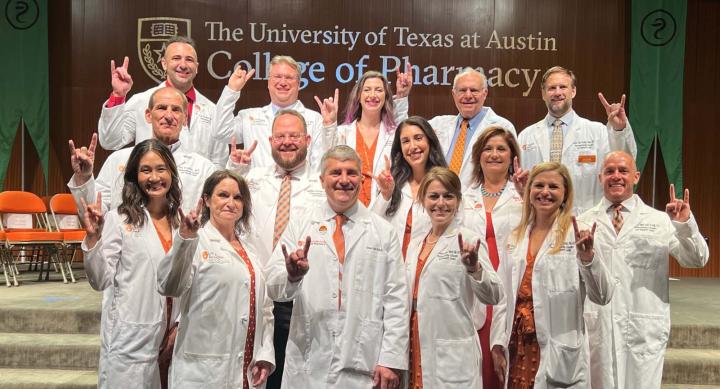
The University of Texas at Austin College of Pharmacy’s Division of Pharmacotherapy in San Antonio is undergoing a significant transformation.
Effective September 1, 2024, the group will become the Division of Pharmacotherapy and Translational Sciences (PTSCI) to better reflect its tremendous growth, expansion and strategic collaborations over the past decade. The PTSCI Division will pursue its mission to educate and train the future leaders of pharmacotherapy and translational science, engage in innovative research and provide exemplary patient care.
The division, led by Chris Frei, Pharm.D., M.S., FCCP, BCPS and Rebecca Moote, Pharm.D., M.S., BCPS, now boasts 16 faculty members (eleven clinical and five tenured), seven administrative/research staff members and supports approximately 150 adjunct/adjoint faculty members, ten graduate students and postdoctoral scientists, 40 pharmacy residents and 60 to 80 student pharmacists annually.
Division faculty received $2.2 million in the 2023-24 fiscal year for grant support as Principal Investigators (PIs), Co-PIs, and Multiple PIs and $14.9 million in grant support as Co-Investigators. Division faculty aim to advance Clinical and Translational Science, particularly focusing on immunology, infectious diseases, cancer and substance use disorders. Faculty members lead at state and national levels. One example is Kirk Evoy, Pharm.D., BCACP, BC-ADM, CTTS, FCCP, FTSHP, who will serve as president for the Texas Society of Health-System Pharmacists (TSHP) in 2026-2027.
A pivotal aspect of the PTSCI Division is its role as the Pharmacotherapy Education and Research Center (PERC) within the Joe R. and Teresa Lozano Long School of Medicine (LSOM), at The University of Texas Health Science Center at San Antonio (UTHSCSA). Dr. Frei also directs the center.
Additionally, the Graduate School of Biomedical Sciences (GSBS) at the UTHSCSA provides academic support for the joint Doctor of Pharmacy (Pharm.D.) program between UT Austin and the UTHSCSA and for the Translational Sciences (TS) Ph.D. Program, a joint-degree program among UT Austin, UTHSCSA, and UT San Antonio (UTSA). Dr. Frei and Kelly Reveles, Pharm.D., Ph.D., BCPS, BCIDP direct the TS Ph.D. Program. Dr. Reveles and Grace Lee, Pharm.D., Ph.D., BCPS are TS Ph.D. program alumni.
In 2023, the UTHSCSA’s Institute for the Integration of Medicine and Science (IIMS), home for the institution’s NIH National Center for Advancing Translational Sciences (NCATS) Clinical and Translational Science Award (CTSA), received its third round of CTSA support ($46 million over seven years). IIMS first gained CTSA funding in 2008 and successfully competed for grant renewals in 2013, 2018 and 2023. Combining the previous awards and supplements with the latest NIH/NCATS grants, the cumulative NIH investment in the IIMS through the CTSA program is projected to reach $126 million by 2030.
The PTSCI division, PERC and the College of Pharmacy are proud and loyal partners of the IIMS/CTSA since it was first established in 2008. PTSCI faculty members lead/co-lead the CTSA’s Workforce Development Program, its T32 predoctoral and postdoctoral career development programs, its TS Ph.D. Program and some of its access and excellence programs. They serve as mentors for its K12 scholars and T32 trainees, and as course directors and faculty supervisors/committee members for its TS certificate, master’s and Ph.D. programs. Laurajo Ryan, Pharm.D., MS, BCPS, and two former faculty members, are alumni of the Master of Science in Clinical Investigation and Translational Science (MSCI-TS) Program.
In 2024, the division established the Endowed Excellence Fund for Clinical and Translational Sciences to support students and trainees pursuing clinical and translational research. Thanks to the generosity of faculty and alumni, the endowment has already grown to a level that will enable disbursements starting on September 1, 2024, to coincide with the new division name.
This transformation marks a new chapter in the division’s dedication to advancing human health through innovation and collaboration.

